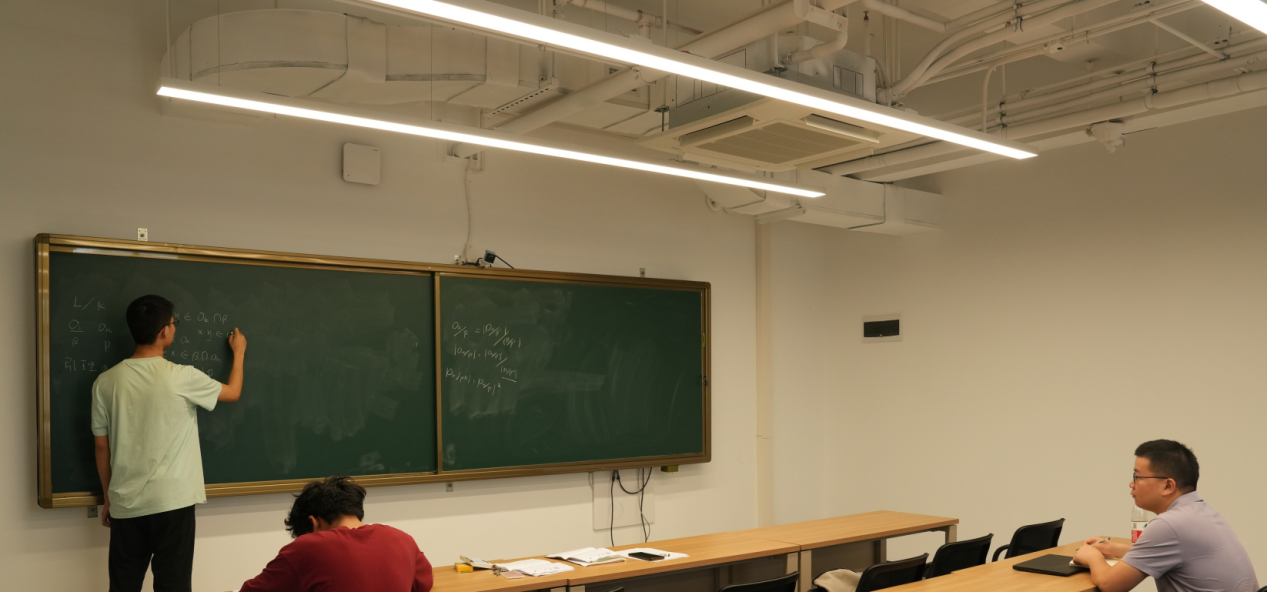This semester, in order to further broaden undergraduates’ academic horizons and enhance their research capabilities, the Algebra Department of our school organized a research seminar under the guidance of Professors Xue Jiangwei, Zuo Kang, Wang Liuquan, and Wang Haowu. I was fortunate to participate in this seminar. The seminar focused on a classic and profound topic in algebraic number theory—Dedekind domains and the property of unique factorization of ideals. Combining theoretical lectures with case analysis, the seminar systematically reviewed and explored key concepts, laying a solid foundation for students to gain a deeper understanding of essential structures in modern number theory.

At the beginning of the seminar, Li Yazhou, a student from the Class of 2023 in Mathematics and Applied Mathematics (Ziqiang Program), served as the main speaker. He began by reviewing the definition of a Dedekind domain, emphasizing its defining features: it must be integrally closed, Noetherian, and of Krull dimension one. Although most participants already possessed some background in abstract algebra, Li carefully clarified the logical relationships underlying the definition to ensure a unified and precise understanding of this important concept. By comparing general integral domains with special classes of rings, he pointed out that Dedekind domains represent a highly central structure in algebraic number theory and frequently appear in significant objects such as the ring of integers in algebraic number fields.
Next, the seminar shifted its focus to the topic of ideal factorization. Unlike the unique factorization of elements in principal ideal domains, in more general rings, the factorization of elements is often complicated and non-unique, and in some cases, factorization can fail entirely. This phenomenon, as observed in rings of integers and similar examples, historically caused considerable confusion. The remarkable aspect of Dedekind domains is that even when the unique factorization of elements fails, every nonzero ideal can still be uniquely expressed as a product of finitely many prime ideals. This property of unique ideal factorization not only extends and generalizes the familiar factorization laws from the ring of integers but also serves as a cornerstone in the study of algebraic number theory. Li systematically introduced methods for establishing this property and provided a detailed explanation of the concept of fractional ideals and their role in ideal factorization, thereby offering clear algebraic tools and background for understanding the relevant theorems.
Building on this foundation, the algebra seminar further integrated concrete examples to deepen participants’ understanding of the theory. Using the integral closure of the ring of integers as a point of departure, the four guiding professors systematically elucidated the crucial role of integral closure in unique ideal factorization. Through this example, participants gained direct insight into the essential structural and property differences between integrally closed rings and general integral domains, thereby attaining a deeper appreciation for the inner logic and elegance of Dedekind domains as well as their significant academic value in modern number theory.
This research seminar not only broadened the participants’ theoretical perspectives in algebraic number theory and stimulated interest in abstract algebraic structures but also laid a strong foundation for future, more advanced academic exploration. Through a wealth of illustrative examples and clear theoretical analysis, attendees not only consolidated their professional knowledge but also deepened their appreciation of the intrinsic beauty and structure of mathematics. Sincere thanks to the professors for their thoughtful organization and guidance, and we look forward to more high-level, intellectually inspiring seminars in the future to support the academic growth of our undergraduates.